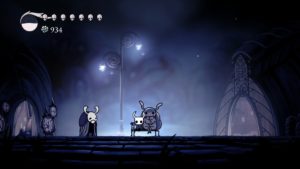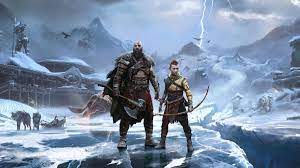What is the Point of Stories in Video Games?
I like gaming, but I’m not the most experienced gamer. This isn’t an insecurity, it’s an expensive and time-consuming hobby, and it’s common for even professional critics to have massive backlogs of games they haven’t had a chance to play. One such entry in my vault was God of War: Ragnarok, which I finally got around to about a month ago.
Having completed it, I can honestly say that it has the best story in any video game I’ve ever played, by a very wide margin. Most games opt for intimate, character-based stories, but this one goes all-in on plot, with lots of twists and turns and a massive scope. That’s not to say the characters are lacking, they’re all on the simpler side but they’re rich, and performed very well. Richard Schiff as Odin is one of my favorite performances in any piece of media, he’s genuinely disarming and hard to read. Additionally, this game probably has the most well-executed plot twist I’ve ever seen. I was shouting at the screen when it happened. What ties it all together is its unique but faithful take on Norse mythology. Other contemporary interpretations like the MCU accomplish something closer to Greek mythology, where the gods are Gods: insane powers, huge personalities, gold palaces, very regal and bombastic. But this game takes a more grounded, understated approach, where the gods are closer to very strong humans than giant deities.
It’s not the greatest story ever told. In fact, it makes some pretty huge mistakes. I was shocked that it didn’t explain how Kratos (the protagonist) got to the Nine Realms after he destroyed Greece at the end of 2010’s God of War 3. This really should have been answered in God of War (2018), but I think people accepted that they were saving it for a sequel. The game suggests that he just sort of sailed there? On a normal boat? Okay, but are these mythological societies in different universes? Are they all on the same planet? There are subtle hints that Japanese, Celtic, and Egyptian mythology are all canon here. And, I mean, what? How does any of this work? The game teases answers, there’s a glowing green rift in Asgard that Odin calls a “source of infinite knowledge,” and the characters spend a great deal of time creating a special mask they can use to look through it. As soon as this was introduced, I was like, “okay, we’re not gonna see it. Someone’s gonna break the mask at the last minute and it’ll be a sequel tease.” Sure enough, that’s what happened. But these decisions are forgivable, and reinforce the main themes of escaping your past and fighting against fate, both of which really spoke to me.

And, here’s the thing, as great as the story is, it’s not the greatest game I’ve ever played– far from it. In fact, it’s kind of…bad? It’s probably the most rigid and linear experience I’ve ever had, it feels like if you’re not moving the character to the exact right pixel, you’re doing something wrong. It holds your hand a lot and introduces so many gameplay elements that it feels like one giant tutorial. It has the hallmarks of an open world game– chests, side quests, secret bosses– but the linearity makes navigating the world such a chore that it actively discourages you. I did a few optional objectives at the beginning, and then decided to ignore them for the rest of my playthrough. The combat is great, all of the weapons are fun to use and it strikes a balance between substance and spectacle. But it doesn’t do anything all that interesting, and it’s bogged down by a host of completely superfluous RPG mechanics, lots of unnecessary stats and gear systems and so on. This game looks you in the eyes and asks you to buildcraft. sorry, no.
This gap in quality between story and gameplay frustrates me to the point where I wish this wasn’t a game at all. I wish I could sit and watch all of the fights and cutscenes. I enjoyed every second I spent with it, but three-quarters of the way through I set it to easy mode so I could burn through the combat sections faster. The cutscenes felt like a reward for getting through each level, and went from something I earned to something I wanted to get to as fast as possible. The namesake– Ragnarok– is a giant, world-ending war, the canonical end to Norse mythology. It’s supposed to be this epic, Lord of the Rings style battle. And while I think it meets the moment narratively, it is very underwhelming gameplay-wise. I was expecting endless waves of enemies or a crazy boss rush or something, but it’s a handful of normal combat encounters, followed by two bosses that are fairly standard and simple (one of which you’ve already fought before). And the third-person perspective was so tight that it didn’t let you see most of what was happening. Every character I had befriended. and all of the armies of the Nine Realms, had joined me in destroying Asgard, and they were all ten feet away, behind a rock, just out of view.

All of this begs the question: what is the point of this being a video game? No, seriously, in what way is this story meaningfully enhanced by interactivity? If I could just spend $20 for the roughly 7 hours of cutscenes and isolated dialogue, would it not have accomplished the same thing? Would it have been better?
What is the point of story in video games in general? For those who aren’t familiar with the medium: games have only had good stories for fifteen years or so. There were passable and competent ones before that, but it wasn’t taken seriously until more recently. The consensus is that 2013’s The Last of Us has the best story in the industry, but it’s roughly the same level of quality as a mid-tier prestige T.V. show (this was proven with the recent Max adaptation.) Other big games like the recent Spider-Man playstation series feel like well-made action blockbusters. Red Dead Redemption II is basically a super long Clint Eastwood movie. So, are we just aping hollywood? Is that the best we can do? This isn’t an inherent negative, it just feels like we’re capping out potential here.
Plenty of games tell good stories in non-traditional ways. Indie darlings like Celeste, Hollow Knight, and Undertale come to mind. But those are much smaller in scale and less complex, and they very firmly put gameplay first. They don’t hit the same as something like Ragnarok.
I don’t like when studios abandon all pretense of a meaningful story, like the Call of Duty franchise or most Nintendo games. But I do respect it, you need a way to frame the gameplay, an excuse to shoot at the bad guys and jump on the mushrooms. Story is a necessity in games, but it’s not always the point.
I think the industry is in a weird place for a lot of reasons, and the way it’s treating narrative is one of them. This medium has existed for fifty years, and it feels like we’re still trying to figure it out. There are so many different genres and platforms, and there’s so, so many good games out there, but we haven’t gotten the big one yet. We don’t have our Citizen Kane, our Sopranos, our Pet Sounds. The one you look at and say, “okay, this is what this medium is, this is what it can be.” Is that the point? This eventual magnum opus? Does every art form exist just to march towards a perfect, singular ideal?
I’m getting a little too broad and philosophical, so just to reign in a little bit: I don’t think there is “a point” to stories in video games, but I know that most of the time, they feel pointless. I don’t expect this to be the case, but I think out of the vast array of talented and successful studios, at least one of them should be dedicating themselves to solving this problem.

